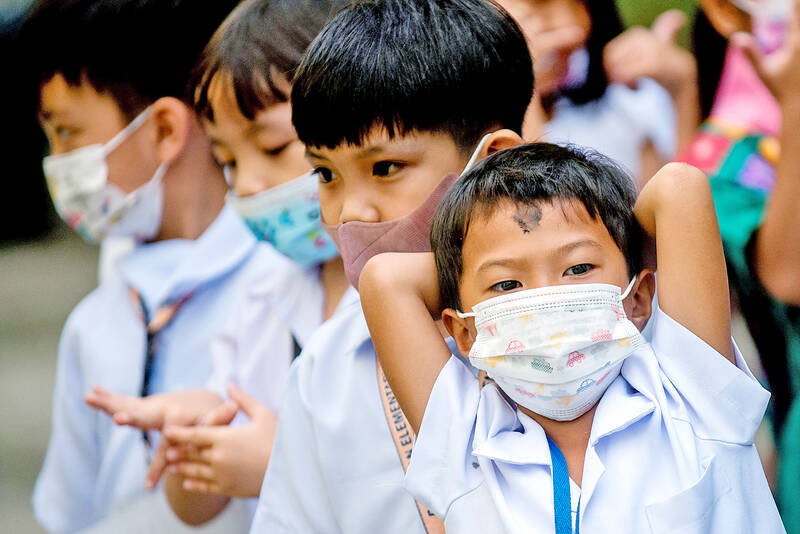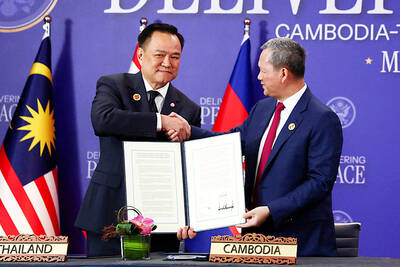State-run schools in a city in the Philippine capital region have shortened class hours due to extreme heat, the latest measure as sweltering temperatures in Asia raise health risks and present challenges to governments and businesses.
“Our utmost priority will always be the welfare of our children,” Quezon City Mayor Joy Belmonte said in a statement. “Since the summer heat is too much to bear, especially in classrooms, we welcome the implementation of blended, modular, or shortened class periods for public schools.”
The Philippines has been experiencing scorching spring weather, with the heat index already reaching the “danger” category. The measure, which takes into account air temperature and humidity, is considered at the danger level between 42°C and 51°C.

Photo: REUTERS
The index reached that stage in eight areas of the country on Friday, the Philippine Atmospheric, Geophysical and Astronomical Services Administration said.
The Southeast Asian nation on Tuesday raised an El Nino alert, forecasting the weather pattern associated with drier conditions and reduced rainfall to emerge from next month, and saying it could persist until the first quarter of next year.
Temperatures have also been climbing across other parts of Asia in the past few months. While this time of year is typically the hottest for parts of Southeast Asia, the soaring heat continues a pattern of severe weather over the past few years that is testing the ability of governments to protect public health and prevent disruptions to recovering economies.
The Quezon City Government said shortened classes would be from 6am to 10:30am for the morning group and 2pm to 6:30pm for the afternoon group.

Shamans in Peru on Monday gathered for an annual New Year’s ritual where they made predictions for the year to come, including illness for US President Donald Trump and the downfall of Venezuelan President Nicolas Maduro. “The United States should prepare itself because Donald Trump will fall seriously ill,” Juan de Dios Garcia proclaimed as he gathered with other shamans on a beach in southern Lima, dressed in traditional Andean ponchos and headdresses, and sprinkling flowers on the sand. The shamans carried large posters of world leaders, over which they crossed swords and burned incense, some of which they stomped on. In this

‘NO COUNTRY BUMPKIN’: The judge rejected arguments that former prime minister Najib Razak was an unwitting victim, saying Najib took steps to protect his position Imprisoned former Malaysian prime minister Najib Razak was yesterday convicted, following a corruption trial tied to multibillion-dollar looting of the 1Malaysia Development Berhad (1MDB) state investment fund. The nation’s high court found Najib, 72, guilty on four counts of abuse of power and 21 charges of money laundering related to more than US$700 million channeled into his personal bank accounts from the 1MDB fund. Najib denied any wrongdoing, and maintained the funds were a political donation from Saudi Arabia and that he had been misled by rogue financiers led by businessman Low Taek Jho. Low, thought to be the scandal’s mastermind, remains

Near the entrance to the Panama Canal, a monument to China’s contributions to the interoceanic waterway was torn down on Saturday night by order of local authorities. The move comes as US President Donald Trump has made threats in the past few months to retake control of the canal, claiming Beijing has too much influence in its operations. In a surprising move that has been criticized by leaders in Panama and China, the mayor’s office of the locality of Arraijan ordered the demolition of the monument built in 2004 to symbolize friendship between the countries. The mayor’s office said in

FIGHTING CONTINUES: Thai military dropped 40 bombs on border areas, Cambodia said, while Bangkok said Phnom Penh launched heavy attacks and damaged homes Cambodia yesterday accused Thailand of intensifying its bombardment of disputed border areas, even as officials from the two countries attend a multi-day meeting aimed at negotiating an end to deadly clashes. The neighbors’ long-standing border conflict reignited this month, shattering an earlier truce and killing more than 40 people, according to official counts. About 1 million people have also been displaced. Cambodian and Thai officials were in their third day of talks at a border checkpoint, with ministers of defense from the two countries scheduled to meet today. However, the Cambodian Ministry of National Defense said Thailand’s military carried out a heavy